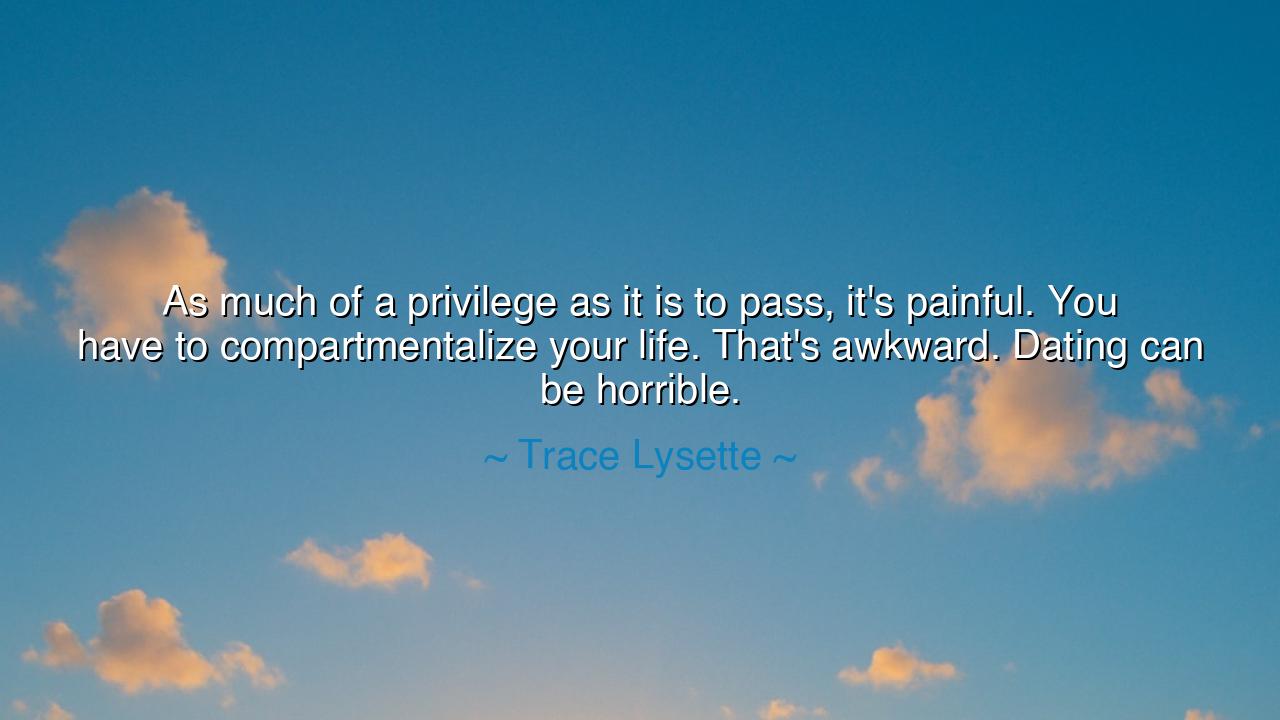
As much of a privilege as it is to pass, it's painful. You have
As much of a privilege as it is to pass, it's painful. You have to compartmentalize your life. That's awkward. Dating can be horrible.






In the hush where names are chosen and selves are stitched back together, Trace Lysette speaks a bittersweet truth: “As much of a privilege as it is to pass, it’s painful. You have to compartmentalize your life. That’s awkward. Dating can be horrible.” Hear the double chord—blessing and burden—sounding at once. The saying is not a complaint but a witness: affirmation granted by the crowd can still cost the pilgrim dearly. The mask that protects may also press upon the skin; the door that opens may creak with secret hinges.
In the ancient manner we weigh each word. To pass is to move through the world without challenge, to be read by strangers as they expect to read you. This can be a real privilege—a cloak against danger, a respite from the nightly audit of stares and questions. Yet the garment is lined with thorns: the fear of being found out, the fatigue of curating stories, the ache of erasing chapters to make the plot acceptable. The body arrives before the biography; the world nods “yes,” but at the price of silence.
Thus the need to compartmentalize—to divide the life into rooms: this for family, that for work, another for friends, a locked drawer for love. The ancients would have called it living in a fortified city: towers of vigilance, narrow gates, signals at dusk. Such vigilance breeds awkward moments—hesitations before pronouns, edits made on the fly, casual questions that are not casual at all. Each day becomes a choreography of self-protection, a dance that begins before breakfast and ends long after the lights go out.
And then there is dating, where the heart steps into open ground. The feast that should be laughter and discovery becomes sometimes a trial: what do I say, when do I say it, will tenderness turn to interrogation? It can be horrible not because love is small, but because fear is large: fear of rejection, of fetishization, of danger, of being reduced to a headline rather than held as a human. In the market of intimacy, one learns the old arithmetic—one honest hour with a decent soul outweighs a dozen glittering nights with those who adore the idea but not the person.
History confirms this terrain. Think of Christine Jorgensen, catapulted into fame in the 1950s not by her choosing, who faced the ceaseless flash of cameras and the coolness of laws that would not let her marry; affection had to navigate public spectacle and private scrutiny. Or recall the unnamed elders who moved quietly through offices and churches, shielding themselves to keep a job, a home, a fragile peace. Their diaries—when we find them—record the same calculus Lysette names: the mercy of passing and the tax it demands.
What, then, is the lesson we pass to our children? First, honor the paradox without shaming it. Acknowledge the privilege and the painful cost together; do not let either swallow the other. Second, replace compartments with corridors—build trusted bonds through which the whole self can travel. Third, reimagine courage not as constant disclosure, but as wise authorship: telling your story where it will be tended, not traded.
Practical rites for the road: (1) Map your circles—who has earned which truths—and update the map as people prove themselves. (2) Craft a few clear sentences for dating—honest, bounded, yours—and practice them until they feel like bread, not thorns. (3) Keep a refuge: a therapist, a support group, or a friend who knows the unabridged edition of you. (4) Schedule restoration—art, sleep, movement—so the soul is not only defended, but nourished. (5) Learn the red flags of fetishization and flee them; seek the green lights of curiosity, consistency, and respect. (6) Where it is safe, make one room bigger each season—join two compartments into one—so the house of your life becomes livable.
In the end, Lysette’s testament is a lantern: it shows us the path with its ruts and its roses. The world may praise the seamless illusion of passing, but wisdom praises the seamless union of the self. Walk toward that union with patience and a steady drum. For though the journey is awkward, and many nights are hard, the day comes when compartments open like windows, and love—true love—crosses the threshold and knows you, whole.






AAdministratorAdministrator
Welcome, honored guests. Please leave a comment, we will respond soon